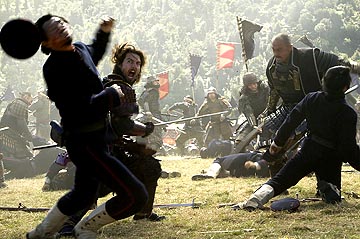




|
The Last Samurai 8 out of 10 |
 |
|
Revolution Japanese Style Although revolutions bring to mind Castro style South Americans and members of the French nobility going to the guillotine, not even the advent of the silicon chip can compare with the complete rebuild of Japan in the late 1860's that the Meiji Restoration ushered in, and whose effects on the ordinary Japanese are observed threough the eyes of US Capt Woodrow Algren, played by Tom Cruise, in the epic "The Last Samurai". When a backward nation meets a more advanced civilization, it has two options - lock out the foreigners and ignore them as an embarrassment or try to beat them at their own game. After Japan found itself pencilled in as next on the Spanish conquistador's list after the Incas and Mayas, Japan's Medievel world had been protected by the coming to power of the Tokugawa, isolating their islands from the rest of the world. By the 1860's however, the arrival of Commodore Perry and his battleship from the USA made it clear that Japan could no longer keep the future out by holding its shoulder to the door. The resulting coup d'etat by the Meiji was to introduce a regime that was the very dream of every inventor, a state that was frantic to obtain and introduce every new idea it could, in as many months as the centuries it had take the West to achieve them. Stepping into this world of staggering upheaval is Algren, a drunk, disillusioned by witnessing America's genocide of its own native people under such celebrated nutters as General Custer. Arriiving in Japan, he believes that he is there to train a joke army of peasants against some savages led by a feudal warlord. Far from being a bunch of Amish-style Luddites who just won't accept modern technology, his Samurai enemies are inquiring and loyal people who are more concerned with the abandonment of traditional values such as honesty, dignity, and service to others before oneself. After being captured, Algren becomes aware of how their teachings make clear all the evils of imperialism that a blind race for industrialization will bring. In a cruel twist of irony, the troubled Algren realises that this is the way of life that would bring him inner peace at last at precisely the moment it is about to be anihilated as the situation is increasingly hopeless for his captor. A loyal and curageous Samurai knight, Katsumoto is played by Ben Watanabe, an actor who quite justly was nomiinated for an Oscar for his performance here. Can Algren head off a cataclysmic conflict that will send the Samurai life to the last round-up in the sky at the eleventh hour or reach some understanding? As the film proceeds, we, the audience are treated to a chance to see how a backward nation was turned into the cruel and ruthless state that would ultimately turn a million Korean women into sex slaves, create the worst prisoner of war camps in history, hold beheading contests in the streets of Nanking and have to be finally put down like a rabid dog at Ground Zero in Hiroshima. Ironically, it would be by the hand of exactly the same class, the scientists, that the Meiji had so dreamt of emulating, and by the same nation who had transformed it, the USA, a country who would certainly come to regret its actions in the Meiji Restoration of 1860's. An action-packed and tear-jerking epic Film Critic: Robert L Thompsett
|
|